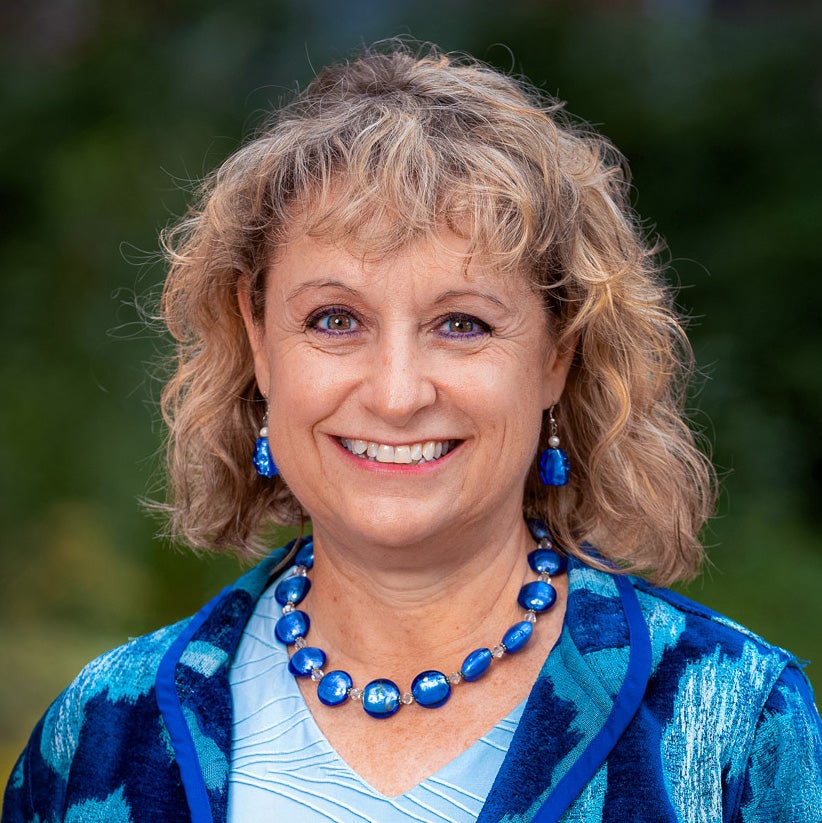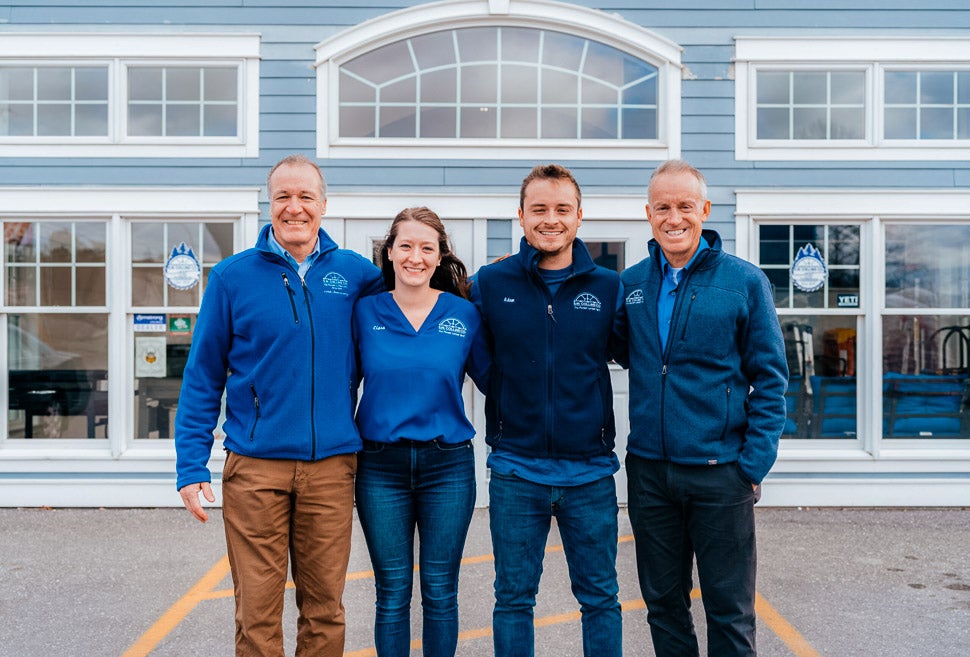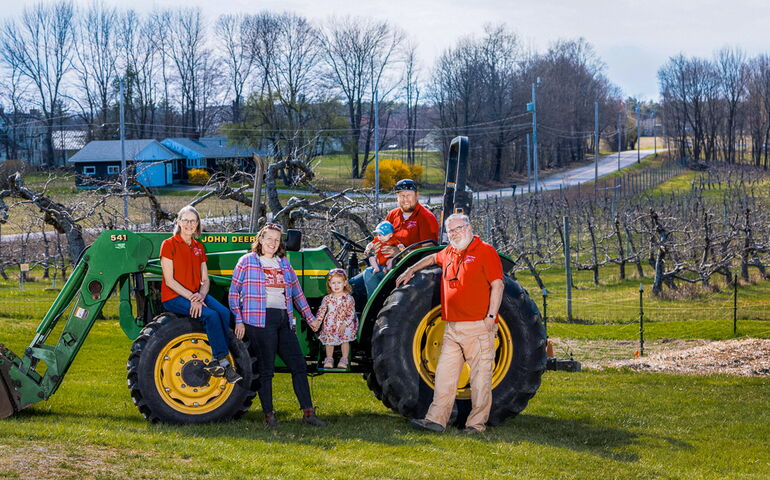The biggest challenge for families transitioning a business from one generation to the next is “starting the process early enough and having the fortitude to see it through,” according to Catherine Wygant Fossett, who runs the Portland-based Institute for Family-Owned Business.

A 2023 Price Waterhouse study found that 72% of owners want the business to stay in the family, yet only 34% have a robust succession plan in place.
Two families we recently spoke with, who run very different multi-generational retail businesses, have been working to structure their transitions, and a written plan is evolving for each of them, but it’s not a quick process. Sorting out all of the details requires a lot of conversations, and a lot of time, while also staying focused on running their businesses.
Two families with their eyes on the future
Both of the businesses Mainebiz talked with — S.W. Collins and McDougal Orchards — are over 100 years old and have successfully transitioned through multiple generations. Still, as Matt McAdam, 8th generation incoming owner at McDougal’s, points out, there’s no set game plan from previous years to refer to, “It’s different every time because the personalities are different.”
Mainebiz met with Matt and his family — sister Polly and parents Ellen and Jack — at the farm on a blustery April afternoon. Matt was just coming in from supervising pruning, no small task with 4,000 trees that need to be trimmed annually.
Matt and his sister Polly are two years into preparing to lead the business. Ellen and Jack moved back to Ellen’s family farm in 1989 and took over from her parents in 2009. Ellen’s ancestors bought the land in 1779, and over the generations, built an orchard. Many of the original trees are still producing today.
The majority of the orchard’s stock are apple trees, in more than 40 varieties, and there are also peach and plum trees. The family also grows raspberries for pick-your-own, and pumpkins and winter squash, which helps to diversify their product lines. They sell directly to customers who come to the orchard to pick, shop, picnic and walk the trails.
Matt and Polly have worked on the farm in some capacity since childhood. They’re in their early 30s and both left for college, travel, and work for other companies — Matt for several growers in Maine — before realizing that the family business was truly in their blood.
Is the next generation fully committed?
Ellen and Jack are delighted that Matt and Polly will succeed them, as they’re in their 70s and looking forward to retirement (Jack more than Ellen). But they were adamant that the kids’ decision was rooted in enthusiasm for the business rather than from a sense of duty. “We didn’t want them back here unless they wanted to be here,” Ellen says.
Ensuring that their children are fully committed to taking over was an early point of discussion at S.W. Collins too. (Mainebiz spoke with company president and CEO Sam Collins and his daughter Clara Collins in a phone call.)
Sam jokes that the first step to transitioning a family business is to have a lot of children; he has four. He agrees though that the conversation starts with gauging the next generation’s passion.
His youngest daughter, Clara, expressed an interest as a teenager, and is the “logical choice” in his mind. “She has the aptitude and the attitude; she has what it takes.”
Clara never felt any pressure to join the business, “It was a matter of ‘absolutely, if you want to.’ It’s very hard for somebody to be half in and half out, especially in a family business. You have to be committed. You have to be there because you want to be.”
Defining everyone’s roles
Clara and her cousin Adam Collins, both 29, worked in the company’s stores during high school and college and have been full-time for the past five years. They’ll be the 6th generation to lead the company. Adam is the youngest son of Gregg Collins, Sam’s younger brother and company vice president. Gregg continues to work closely with suppliers and the company’s 100-plus employees, which the family calls “pioneers.”
Responsibilities for the incoming leaders are already fairly well defined. Clara is operations manager, focused on streamlining processes and enhancing customer experience. Adam has expertise in business development, focuses on driving growth and strengthening the pioneer team. Both have business degrees with concentrations in finance and management; Clara focused on supply chain management.
“For the most part all of us are full-time,” says Sam. “But we’re passing off some of the responsibilities to allow for more flexibility for myself and Gregg. Adam continues to take on more purchasing responsibilities and manages our Presque Isle store. Clara spends time with pioneers across locations and positions to drive change.”
All four family members are involved in the long-term strategic planning and purchasing of core categories.

Neither Sam nor Gregg have set a date for their retirement, but Sam expects to step down “within the next few years.” They’re both in their 60s and Sam has been at the job for 44 years and Gregg for 37 years.
The McAdams have already sorted roles too. Polly is working with Ellen to take over the financials and manages the website, social media, events, and farmstand employees. Jack still handles the ‘back end’ of the website and SEO but Polly envisions taking that over too.
Matt has a degree and experience in horticulture and oversees the orchard, equipment and maintenance, and the field crews. He’s just hired a supervisor to share some of his responsibilities, for January through October. This is a first for the farm, a sign of growth. During the season they generally have 12 to 15 employees, mostly retirees and college students in the summer. The farm has a lot of returning staff every year and doesn’t struggle to hire.
Structuring the transition
The McAdam family meets every Friday morning to discuss immediate needs and to fine-tune their business plan going forward. They’ve agreed on a mission statement: “To provide a secure environment for farming the land, through prudent investment strategies and successful farm business practices, and to foster appreciation for local agriculture through community outreach and on-farm educational opportunities.”
They’ve taken advantage of succession guidance through workshops at the Institute for Family-Owned Business, and from programs tailored to farm transitions at the York County Cooperative Extension and the Land for Good program, based in Keene, N.H.
The Collins’ team has also attended some Institute for Family-Owned Business workshops but is largely working through the succession independently. “We’re planning an ownership retreat in the next couple of weeks and will proceed with those kinds of meetings,” Sam says. “It’s a discovery process for all of us. We want to understand which roles are the best fit.”
Clara says, “It’s important to make a plan and stick to it, and then let the next generation make their own mistakes, and their own decisions.”
Communication with employees during the process is vital to a smooth transition. Clara notes. “It’s really important to communicate to our team that we’re not selling, and we do have a plan to make this a smooth transition. People are used to knowing who to go to for things. We want there to be no confusion or lack of clear direction.”
“We’re moving into the more challenging phases now, “Sam says. “Adam and Clara need to learn the business, and there’s a lot to the lumber business, not just the product part, but the running of the business.”
Focusing on growth
Both companies are actively strategizing for growth. Sam Collins says, “Our focus is making sure that operationally we’re improving every day and getting our processes to run more smoothly. And we’re reinforcing our foundation so we can continue to grow.
“We’re also making changes to make it more attractive to work for us, adding benefits, and we’re recruiting more talent.”
Sam is effusive about his staff but says hiring licensed commercial drivers is a challenge, as is finding enough skilled carpenters for the company’s millwork shop. “We’ve recently brought in a CNC machine and we’ll be looking for someone who is more able to work with technology. I think that kind of person might be easier to find.”
As an agricultural business, the McAdams are challenged with harsh weather, which can damage crops and keep customers at home, and they’re constantly on watch for fruit diseases and destructive insects.
To boost revenue, Polly is expanding their online presence, and has been trialling a range of on-farm classes. Their cider business and community supported agriculture program (where customers pre-purchase weekly pickups) are strong and growing, they host school field trips and birthday parties, and offer wagon rides and orchard tours. Scheduling more educational workshops for customers is a current push.
Polly and Matt attended an agri-tourism seminar but came away committed to keeping the business focused on the agricultural experience they provide, rather than adding light shows and bounce houses. “We have a very strong idea about what we don’t want to be doing. We want to encourage people to come here to be outside and to slow down a little.”
To ensure that their land remains in agricultural use in perpetuity, the McAdams have a conservation easement on most of the acreage, and they’ve incorporated the business and land separately.
The family is actively involved in supporting other farms in the region. Jack serves on the Sanford planning board and Matt is a member of the committee charged with updating the town’s comprehensive plan, in part because he’s intent on “conserving farm spaces.”
Ellen works with multiple agricultural agencies and is involved with several research projects focused on increasing crop health, which is vital to sustaining the orchard.
At S.W. Collins, Sam sees growth potential through customer service. “We want to be the employer of choice that engages our ‘pioneers’ in a way that they’re motivated to serve our customers and our communities.
“We envision our company continuing to grow in markets that provide opportunities for our model. And we may continue to grow geographically in locations that fit our business model.”
Speaking for the next generation, Clara adds, “But we’re not growing for the sake of growing. We want to make sure we’re being strategic about our choices.”
